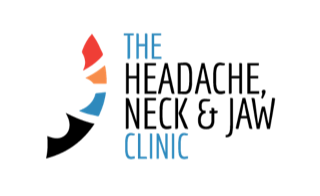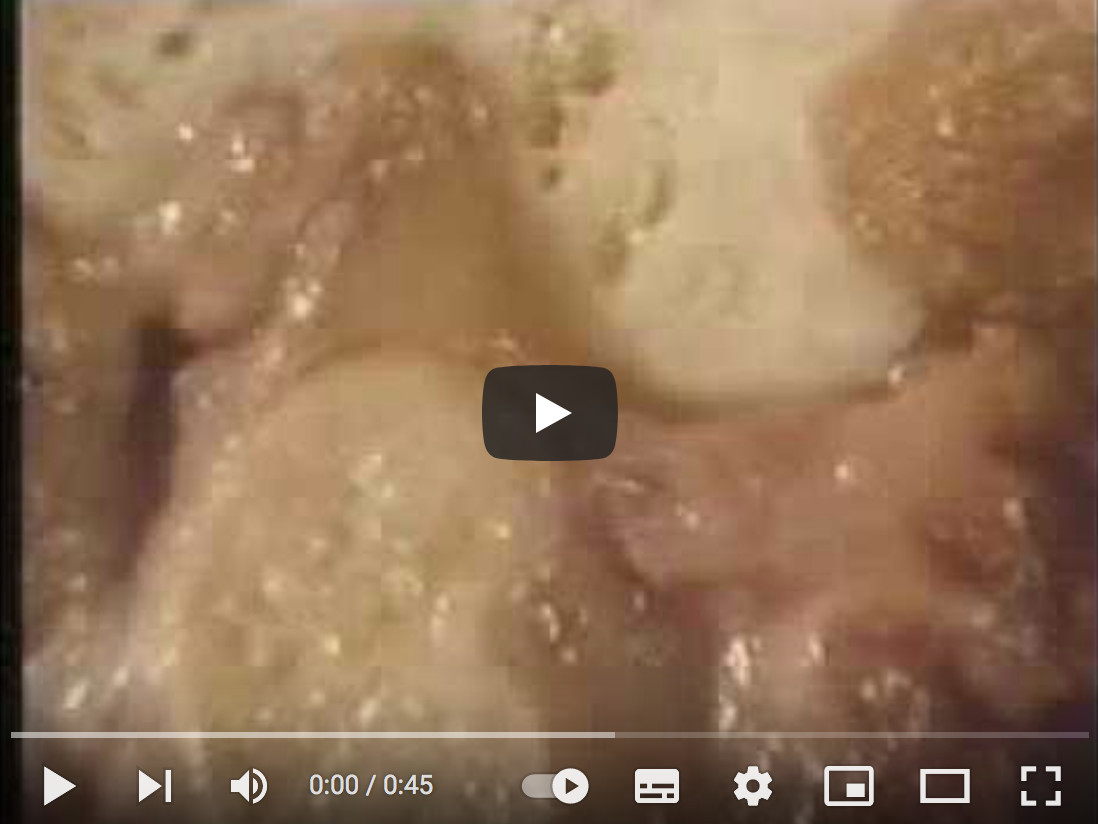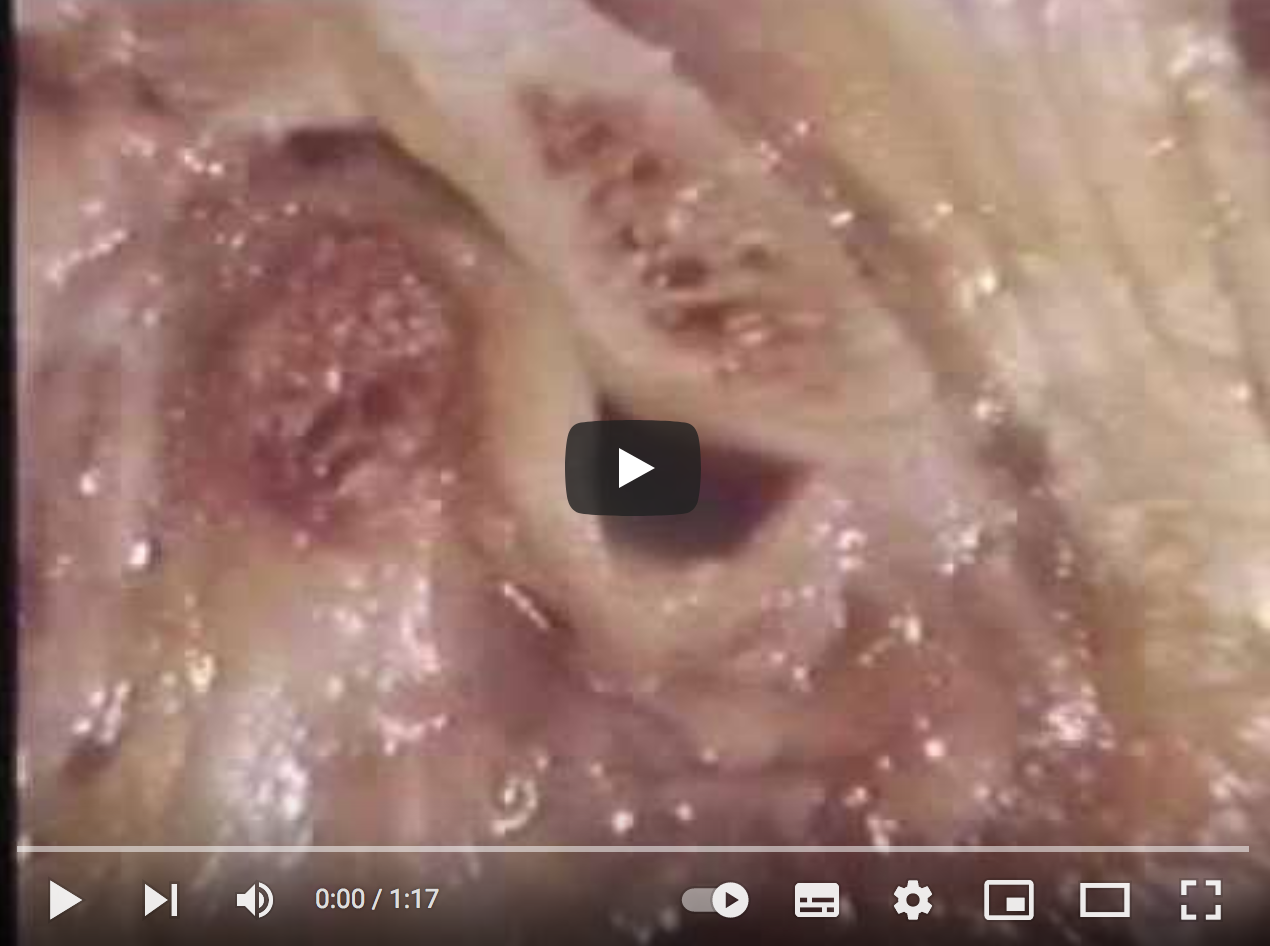TMJ Physiotherapy Specialists
The Headache, Neck and Jaw Clinic are TMJ specialists in Brisbane and the Gold Coast that aim to reduce and resolve acute and chronic jaw pain conditions.

Treatment for TMJ and Jaw Pain
The jaw is one of the most complex joints in your body. When it’s injured or something goes wrong, the pain in your jaw, face and head can be severe.
You may not have considered physiotherapy as your first step in treating TMJ or jaw pain, but the root cause often lies in the muscles, joints and nerves around the jaw and neck.
If you’ve tried jaw exercises or posture corrections with little success, it’s likely because they don’t address the deeper, underlying dysfunction. Real, lasting relief doesn’t come from generic stretches; it comes from targeted, hands-on physiotherapy.
By treating the temporomandibular joint (TMJ), surrounding muscles and associated neural tension, physiotherapy can ease pain, restore normal jaw movement and help break the cycle of clenching, grinding or stiffness. It’s a precise approach that looks beyond the surface to give you long-term relief from TMJ dysfunction.
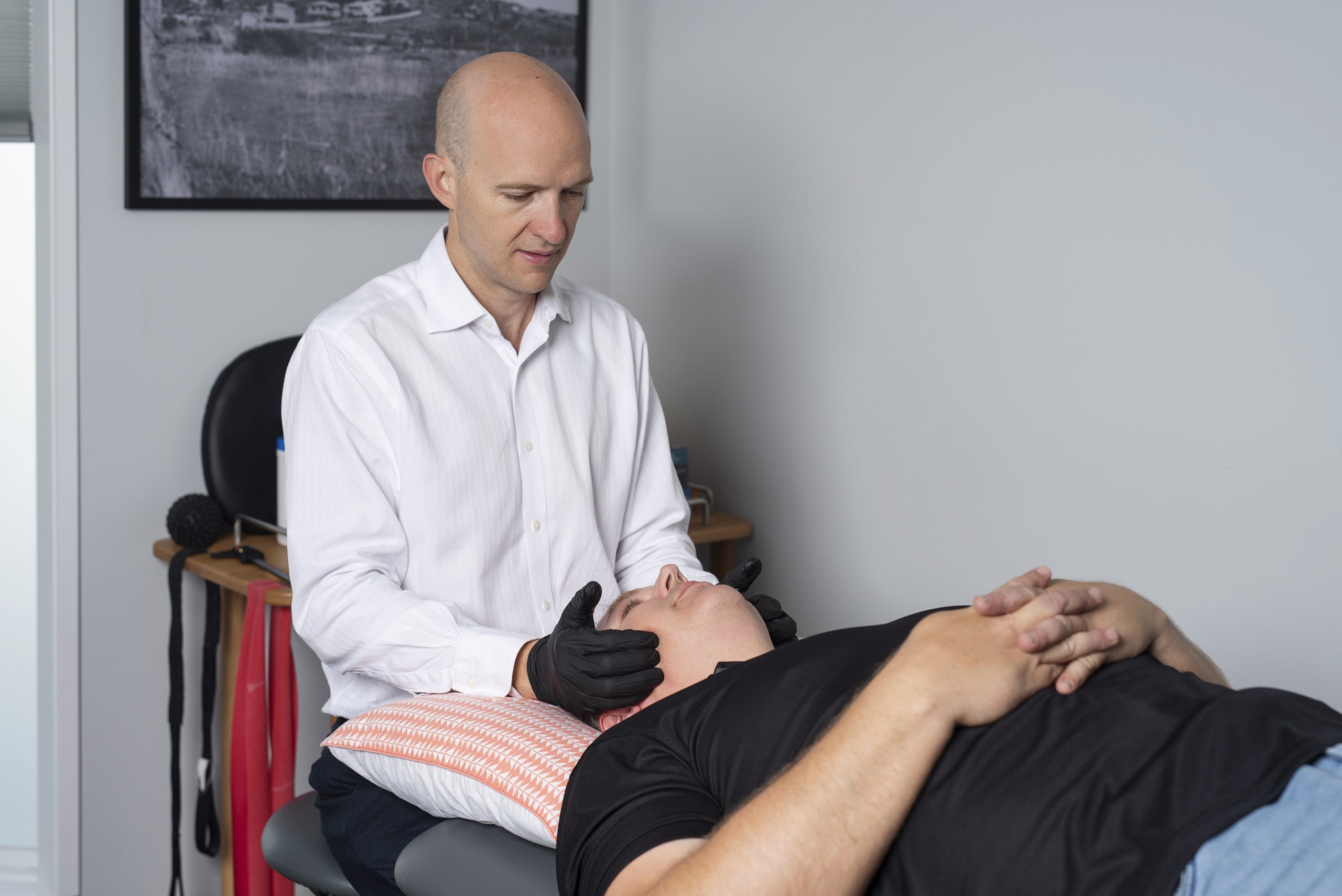

Tried Treatment for Jaw Pain Before That Didn’t Work?
If you’ve been dealing with jaw pain, clicking, clenching or tension without lasting relief, you’re not alone. Most people think jaw pain starts and ends with the jaw joint (TMJ), but that’s only part of the story.
The truth is, jaw pain is often driven by neural sensitivity, not just tight jaw muscles or dental issues. Neural sensitivity is when everyday movements like chewing, yawning, or even talking can become painful because the nerves around your jaw, face and neck are overreactive.
At the Headache, Neck & Jaw Clinic, we specialise in identifying whether your jaw symptoms are coming from the TMJs themselves, the surrounding muscles, nerves, or even your neck, and more importantly, what we can do to help.
Our team has advanced training in assessing the complex interplay between the TMJ, upper cervical spine, cranial nerves and facial muscles. This means we can pinpoint the root cause of your symptoms with far greater accuracy than general treatment approaches.
If you’ve tried splints, exercises or massages and they didn’t help, it doesn’t mean your problem can’t be treated. It just means the approach wasn’t right for your type of jaw pain.
TMJ and Jaw Pain Conditions We Treat
- Pain or tenderness of the jaw
- Clicking jaw: Anteriorly Displaced Disk with reduction
- Restricted opening
- Post Arthrocentesis rehabilitation
- Facial reconstructions
- Jaw replacements
- Grinding teeth: bruxism
- Facial & ear pain
- Locked jaw: Anteriorly displaced disk without reduction
- Persistent tooth pain not responding to dental treatment
- Bells Palsy/Ramsay Hunt syndrome
- Arthritis/Arthralgia (jaw joint pain)
- Myalgia (muscle pain)
Understanding Your Jaw Pain
Getting relief starts with truly understanding your symptoms. We take time to map out where you feel pain, what it feels like, and what it’s stopping you from doing, whether it’s eating, talking, or just relaxing.
What To Expect From Our Assessment
Comprehensive Examination
As part of our examination, we listen to your story and discuss your pain, symptoms and any jaw and joint injuries you have.
Hands-On Assessment
We’ll perform a complete assessment of your jaw to identify dysfunction and help our physiotherapists design a treatment.
Symptom Relief
Our physiotherapists use specific treatments to improve jaw mobility, reduce pain and strengthen the joint and muscles.
Patient Education
We can answer any questions and provide advice on managing your pain, recovering from injuries and changing your habits.
How We Can Help with Jaw Pain
Our approach to jaw pain is hands-on, thorough and personalised. Your initial appointment runs for a full hour, because that’s how long it takes to truly understand your history, symptoms and goals.
We start by asking questions like:
- When did your jaw pain begin, and what makes it worse?
- Have you had dental work, trauma or previous treatments?
- Do you clench or grind your teeth during the day or at night?
- Are you missing out on food, social connection or rest because of pain?
Then we assess:
- Joint mechanics – how your jaw moves and whether there’s restriction
- Muscle tension – including the jaw, face, neck and shoulders
- Neural sensitivity – how irritated or overactive the surrounding nerves are
- Postural and neck involvement – whether stress in your neck is referring pain to the jaw
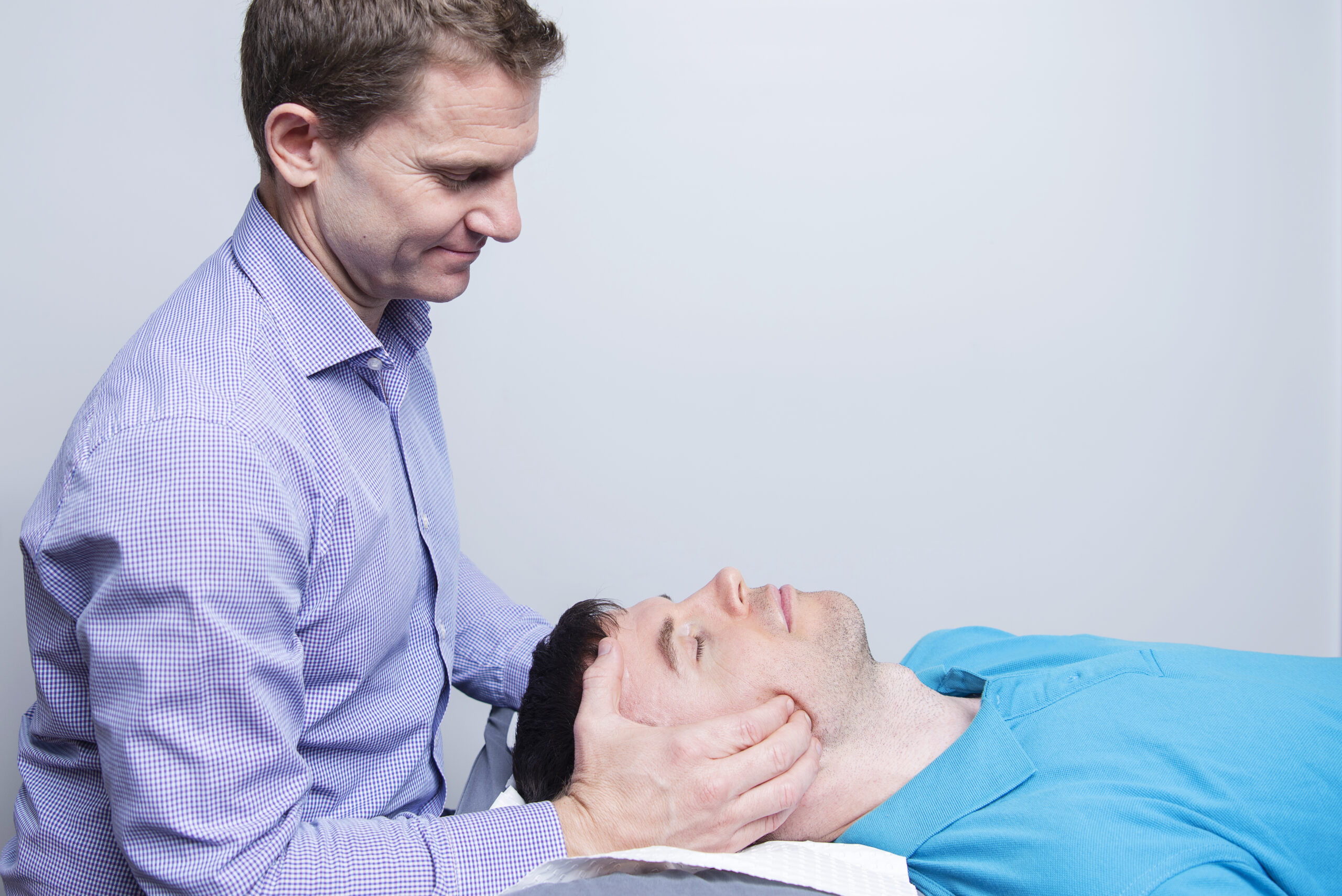

We use a framework to track your symptoms using four key factors:
- Frequency – How often do symptoms flare up?
- Duration – Do they last a few minutes or all day?
- Intensity – What’s the severity on a 0–10 scale?
- Location – Is it one side or both? Just the jaw or also the head, ear or neck?
By your first or second treatment, we expect to see a clear response. If we can reduce your pain or improve your jaw movement during the session, we know we’re on the right track.
After 3–4 sessions, we reassess:
- How often your jaw pain is occurring
- How intense and long-lasting each episode is
- Whether your range of jaw movement has improved
- If associated symptoms (headaches, earaches, neck tension) are reducing
- How much better your quality of life feels
If you’re improving, we keep going. If there’s no change after a few sessions, we’ll be honest: we may not be the right solution, and we’ll help you explore the next step. No guesswork. No wasted time.
Reach Out To Us!
Get in touch with us today for more information on our services or to make an appointment with our friendly team.
Ready To Book Online?
Book your appointment online today! Our TMJ treatment plans can help with managing pain, reducing symptoms and assisting you in your recovery.

How Specialised Physiotherapy for TMJ Pain Works
To understand how our treatment helps, you need to know a little about why jaw pain happens.
The temporomandibular joints are complex joints that allow the jaw to move up and down, side to side and forward/back. These joints work closely with muscles in the face, neck and skull, so when something goes wrong in one part, the whole system can be affected.
Often, TMJ issues don’t begin in the joint at all. The real driver can be:
Repetitive clenching or bruxism
Poor posture or neck strain
Trigeminal nerve sensitivity
Stress-related tension
Neck dysfunction that overloads the jaw
These nerves feed into the trigeminocervical nucleus (TCN), the same part of the brainstem responsible for processing pain from the head, neck, jaw and face. When the TCN becomes hypersensitive, pain can be referred from one area (like the neck) to another (like the jaw or temples).
This explains why your jaw might hurt even if you haven’t injured it, or why it feels worse when you’re tired, stressed, or sitting at a desk all day.
Our targeted physiotherapy techniques, including hands-on joint mobilisation, neuromuscular retraining and desensitisation, aim to calm this system down, restore movement, and reduce your pain at its true source.
Normal TMJ Rotation and Translation
Anterior Disc Displacement With Reduction
Frequently Asked TMJ Questions
Physiotherapy targets the mechanical, muscular and neural causes of jaw pain. This includes assessing the temporomandibular joints, facial and neck muscles, and the trigeminal cervical nucleus. This is the part of the brainstem that processes signals from the jaw, face and neck. Using hands-on techniques, we reduce neural sensitivity, release muscular tension and restore proper jaw function for lasting relief.
While splints and medication can help manage symptoms, physiotherapy addresses the underlying cause. By improving joint mobility, calming irritated nerves and correcting contributing neck or postural issues, we aim to fix the root problem, not just mask it. This can lead to fewer flare-ups and less need for ongoing intervention.
Most people feel a difference within the first few sessions. After 3–4 treatments, we reassess key factors like pain intensity, jaw mobility, symptom frequency and quality of life to track your progress. If we’re not seeing improvement, we’ll be upfront and guide you to the next step. We won’t keep stringing you along with endless appointments.
Yes. Even without active pain, we can assess movement patterns, joint mechanics and neural sensitivity. In many cases, we can gently reproduce your typical symptoms to confirm the source of your pain and guide treatment accordingly.
That’s a great sign! Early relief means we’ve likely identified the right area to treat. To keep the improvement going, we’ll still recommend a short course of care to strengthen the result and help prevent your pain from coming back.
Yes. Our methods are gentle, evidence-based and highly specific. We don’t use forceful jaw manipulations. Instead, we rely on precise manual therapy and retraining techniques tailored to your symptoms, tolerance and goals.
We treat TMJ dysfunction, muscle-related jaw pain, bruxism-related issues, cervicogenic jaw pain, neural sensitisation involving the face and jaw, and postural jaw dysfunction. Our focus is on musculoskeletal and nerve-driven causes that respond to physiotherapy.
